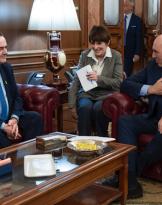Last week at the University of Rome LUMSA the conference "1918: the reasons for victory, 100 years later" was held.
To attend the event teachers, diplomats and a soldier who in recent years has dedicated himself with passion to the confrontation on the first world war, the general Massimo Panizzi.
A serious and costly war in terms of human lives but with multiple implications, surprisingly also positive, and with key interpretations still to be attributed.
"Caporetto was a serious defeat, but not the mortal blow that the enemy wanted. The retreat to the Tagliamento before, the Piave then, was studded with fierce fighting and numerous episodes of pure, clear heroism on the part of our soldiers. The Battle of Pozzuolo del Friuli is a wonderful example, a masterpiece of tactics, self-sacrifice and courage of the Lancieri of Novara, of Genoa Cavalleria and of the Bergamo Brigade. The sacrifice of those brave men allowed the Third Army to retreat unscathed over the Tagliamento River. It was a gradual, but steady recovery, whose key moments are the Battle of Stopping on the Piave and Grappa, the Battle of the Solstice, and the final one of Vittorio Veneto. In this picture - added Panizzi - our armed forces cooperated effectively. The Royal Navy, in particular, assured the defense to the bitter end of Venice and the cover of the flank of the Third Army. Furthermore, thanks to the naval blockade in the Canale d'Otranto, it contributed to prohibit supplies to the Austro-Hungarian ports of the Adriatic, accelerating their collapse. In short, we witnessed the occurrence of a unique event in the history of our country: the stubborn will of all - army and people - not to lose a war that would have brought our young nation back to foreign domination. These are the determining factors of the victory of the 1918: unity of purpose (at all levels, political, military, social), mutual assistance between allies (do not forget that Italy sent an Army Corps to the French, in Bligny), the very effective synergy between the members of the armed forces, the growing feeling of national pride, the strong and renewed camaraderie among the military and the prodigious ability to adapt the Italian soldier."
We recall that with women's work replacing the millions of men at the front, women's rights will get an otherwise very random acceleration. Understanding the dynamics, the potentials, the transformations and the errors of that period could help to understand the battles - too many "Caporetto" included - of the present.
We hope that, as then, having scraped the bottom is the prelude to a national rescue!












